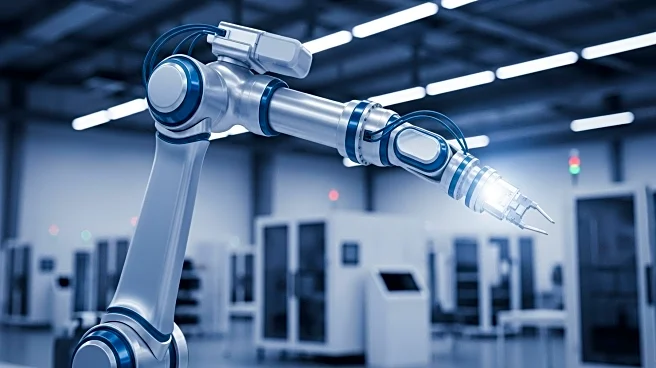What's Happening?
Adrian Stoch, the CEO of Hai Robotics USA, is spearheading the company's expansion efforts in the United States. Stoch, who transitioned from GXO Logistics, is focusing on aligning automation solutions with customer needs, a strategy driven by the innovative culture of Hai Robotics' founder, Richie Chen. The company is responding to global supply chain challenges and labor constraints by shifting towards large-scale automation. Stoch's goals include building a talented team and implementing lean processes to support growth and customer success. This expansion is part of a broader trend in the robotics industry, where companies are increasingly adopting automation to enhance efficiency and meet rising consumer demands.
Why It's Important?
The expansion of Hai Robotics in the U.S. is significant as it reflects the growing demand for automation solutions in response to supply chain disruptions and labor shortages. By focusing on customer-centric automation, Hai Robotics aims to improve operational efficiency for businesses, potentially reducing costs and increasing productivity. This move could benefit industries such as logistics, manufacturing, and retail, which are heavily reliant on efficient supply chain operations. As automation becomes more prevalent, companies like Hai Robotics are positioned to play a crucial role in shaping the future of these industries, potentially leading to increased competitiveness and innovation.
What's Next?
Hai Robotics plans to continue its expansion across the Americas, focusing on building a strong team and refining processes to ensure customer success. The company is likely to face competition from other robotics firms also seeking to capitalize on the demand for automation. Stakeholders, including businesses and industry leaders, may react by investing in similar technologies to stay competitive. Additionally, there may be regulatory considerations as automation becomes more integrated into various sectors, potentially influencing policy decisions related to labor and technology.
Beyond the Headlines
The expansion of Hai Robotics in the U.S. could have broader implications for the workforce, as increased automation may lead to shifts in employment patterns. While automation can enhance efficiency, it may also result in job displacement, necessitating retraining and upskilling initiatives. Ethically, companies must balance technological advancement with social responsibility, ensuring that workers are supported during transitions. Culturally, the adoption of robotics may influence consumer expectations and business practices, driving innovation and potentially altering market dynamics.









